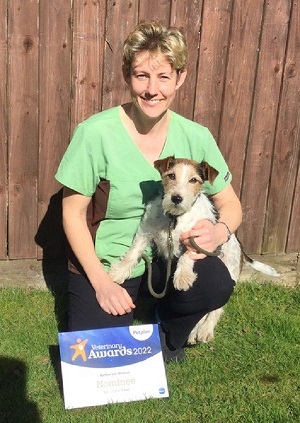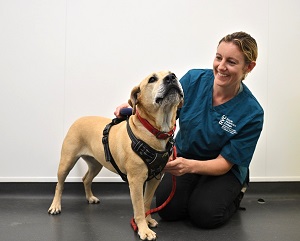From Acorns Mighty Things Grow
Clinical Connections – Summer 2025
Clinical Connections interviewed Katharine Nelson, RVC’s Director of General Practice, which spans the Beaumont Sainsbury Animal Hospital and Acorn House Veterinary Hospital. Katharine started at Acorn House after graduating from Cambridge and was previously Clinical Director and Practice Principal at the Bedford hospital.

What are the most significant changes you observed across the sector in the 21 years you were at Acorn House?
I joined Acorn House as a new graduate in 2003 and in the decades I was there the profession changed a lot. Key changes include moving away from traditional partnership models to corporate ownership of practices and a tendency for mixed practices to evolve into dedicated small or large animal practices. There has been increased pressure on vet recruitment and retention (which has probably led to an improvement in working conditions for vets but also a rise in costs for clients). The introduction of dedicated out-of-hours provision has made it much less common for vets to stay and be on call for their own patients.
There have also been significant developments in referral practice. In the past there were relatively few places to refer complex cases to – we used to do more in house. There have also been many changes in the regulation and accreditation of veterinary practices, and the introduction of formal mentoring after graduation - the VetGDP system. And of course, during the pandemic we had to adapt to “carpark” consulting and constantly changing criteria around essential care and client/staff interactions. It was a privilege to lead Acorn through all of those changes, watching it expand and evolve.
What attracted you to the role at the RVC?
Thinking about the way that general practice had evolved over the preceding 20 years, I was ready to move on from managing these changes as they applied to one practice and to influence a broader range of general practice provision; not only with regard to the patients and clients but also for the staff and students working there. The experience that the RVC provides its veterinary students through the general practice rotations has such an impact on the next generation of veterinary surgeons and makes it the ideal place to lead change.
You have come to the RVC at a very exciting time of its history, what is most exciting for you?
The increasing emphasis on general practice for vet students has been driven by accreditation changes, and it will affect all UK vet schools, but the RVC has really embraced it and is using it as a catalyst for significant evolution. This will transform not just our teaching provision and the general practice services offered to the community but also the career pathways for general practice vets. We have the opportunity to lead in that area.

Could you give a summary of your role and how this is likely to evolve as the general practitioner component of veterinary training increases?
My role is to provide leadership and strategic direction to the general practice sites owned by the RVC. A lot of that is about collaboration across the sites and ensuring collectively that we are offering the right experience to students and clients. But that might not be the same in each site. For example, shelter medicine is more likely to focus on pragmatic care, neutering and control of contagious disease in a shelter environment; whereas Acorn House, as a commercially successful practice, is more client-focused. The Beaumont Sainsbury Animal Hospital currently plays a much greater role in student teaching than Acorn House but there is some work to be done as to how we best present that offering to the clients there.
In the short term, my role has really been bringing the commercial and client experience angle from Acorn House into the Beaumont Sainsbury Animal Hospital and that has also been useful for me to understand how the Beaumont Sainsbury Animal Hospital works. In the medium to long term, I will be looking at how best we can use our general practice sites to support new career pathways for GP vets, deliver the best teaching experience for veterinary students, and offer something different to our clients. In the end we want to be more defined as to what our USP is as a teaching hospital, instead of trying to just be a general practice that happens to teach students at the same time.
How do clinicians at the Beaumont Sainsbury Animal Hospital and the Queen Mother Hospital for Animals collaborate now – and how might this progress in the future?
The RVC Exotics service is based at the Beaumont Sainsbury Animal Hospital, with both referral and general practices services operating side by side. The referral exotics team also have a clinic at the Queen Mother Hospital for Animals where they can access the CT scanner and collaborate further with specialists in other disciplines.
For our cat and dog services, the Beaumont Sainsbury Animal Hospital is a general practice, staffed by GP vets. Patients that require specialist care are referred to the Queen Mother Hospital. Specialist clinicians at the QMHA are always available to provide advice to our GP vets and are very willing to visit the Beaumont to provide training and guidance – for example between March and July this year we have had a senior member of the anaesthesia team visit every fortnight to support our vets and nurses and students in advancing their skills, based around the cases at the Beaumont Sainsbury Animal Hospital.
We also have some long-standing research clinics (for geriatric cats and for dogs with mitral valve disease) at the Beaumont Sainsbury Animal Hospital, which are staffed by specialist clinicians from the Queen Mother Hospital for Animals. This provides specialist staff with a general practice caseload for research that is absolutely relevant to general practice; and offers opportunities for informal collaboration between teams.
I'd like to explore the possibility of offering more specialist-led services out of Camden and possibly also Acorn House. For many of our clients, it’s not easy to take their pet to Potters Bar, so it would be worth looking at the possibility of a hybrid approach – having a GP-led consultation at one of the primary care sites with a specialist on video call. This could improve convenience and confidence for clients to access specialist care; maintain the GP vet as the primary coordinator of veterinary care and increase interest and knowledge for GP vets. There's no reason why we would only be able to do that in our own sites either – it could be offered to other veterinary practices.
What would you say to any vet considering moving across to the RVC to take a new step in their career?
I would say that this could be exactly what they are looking for! It opens up a whole new vantage point. Moving to the RVC provides opportunities to impact the next generation of vets and to be involved in research without losing access to the challenges and opportunities that vets are already exposed to in commercial practice.
The RVC is such a big organisation, with so many amazing and talented people and a fantastic history – it is an absolute privilege to be part of the journey.
As well as being an experienced vet, you did an MSc in Clinical Animal Behaviour and have been a Consultant in Animal Behaviour. Do you get the chance to be involved with that aspect of work here?
Although I continue to see a small number of clinical behaviour cases, primarily at Acorn House, I think I can have the most impact in this area by embedding behavioural medicine into our general practice sites and client/pet/student experience on a more general level.
For this reason, I have established relationships between Acorn House and the Beaumont Sainsbury Animal Hospital with trusted animal behaviourists and trainers – both sites now have professionally-run puppy classes running in their reception areas outside of normal hours and good relationships with local veterinary and non-veterinary behaviourists. Animal behaviour training is available to staff through a variety of routes. The aim is for behaviour cases to have the same status in general practice as medical and surgical cases – we should expect to provide preventative advice and behavioural first aid/uncomplicated care as a minimum, with good routes for referral if additional expertise is needed.
